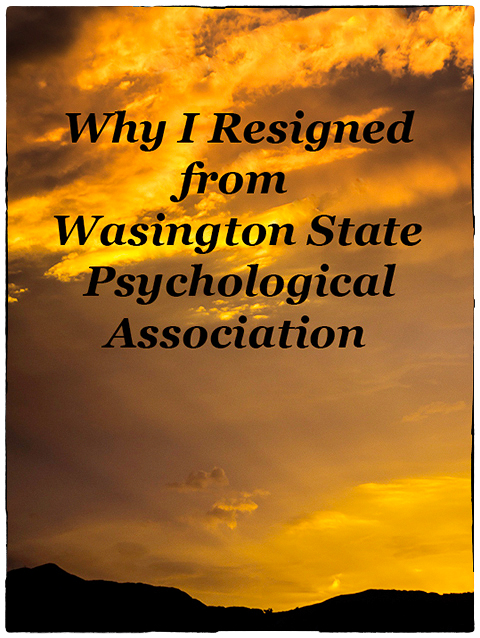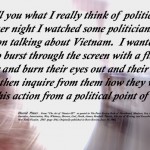This post is my resignation letter sent to Doug Wear PhD, the Executive Director of a professional organization I have been a proud member for over 20 years — Washington State Psychological Association (WSPA).
I moved to resign because of two issues. WSPA maintains sponsorship of a company (United HealthCare) that epitomizes the maxim — Caveat Emptor (“Buyer Beware”). It has been my feeling that this sponsorship gives support to corporate practices that have resulted in significant penalties following federal and state investigations for fraudulent practices, as well as advancing the pursuit of greed and profit ahead of benefit for subscribers, providers, and the general healthcare system.
Second, it is my belief that American Psychology’s credibility as a leader promoting human dignity and human rights is severely compromised by APA policies giving ethical cover for government policies that violate domestic and international legal protections of “national security” detainees, and for Psychologists who work in those same settings that violate the UN’s Universal Declaration of Human Rights Human Rights, and the Convention against Torture and Other Cruel, Inhuman or Degrading Treatment or Punishment. I became discouraged that WSPA did not vigorously challenge this policy by calling for the annulment of the key document of the American Psychological Association (APA) that codified this ill-conceived and self-serving precedent.
In a forthcoming post I will be providing additional background, links and references for readers who are unfamiliar with the issues I address in my letter.
1/21/13
Dear Doug,
I am writing this letter to let you know you that after much consideration I am withdrawing from membership in WSPA. This is a very difficult decision as I have been a member for 20+ years.
Over the years I’ve appreciated how WSPA has been active in countering efforts by insurance companies and “managed care” to restrict client access to services and control the ability to practice our profession at the highest standards of excellence. I’ve also appreciated how WSPA did its part in advocating for equality and rights for LGBT people, and taken stances on other important social and professional issues, including those related to cuts in services for the less advantaged in our state. These are examples of how our state association has been vocal in promoting what Alfred Adler called “Social Interest”. These efforts reflect well upon psychology’s societal role as a voice fostering values that enhance social and individual well-being.
On the other hand, I have lost confidence in WSPA’s leadership as a result of positions taken on issues that are of paramount importance to me as a Psychologist concerned about the impact of corrupt corporate practices on our social/economic well-being, and an embrace of a national security mentality that in fact compromises Psychology’s integrity as a healing profession. In short, I remain very troubled about WSPA’s capitulation to United HealthCare by continuing to sponsor it as a member “benefit”, despite this company’s history of market manipulation, financial greed, outrageous CEO compensation, and blatant disregard of who is tossed on the tracks in their pursuit of profit. I am also disturbed by WSPA’s virtual silence on the ethical degradation of our profession represented by the Psychological Ethics in National Security Task Force Report (otherwise known as “PENS Task Force”).
I find no small irony that WSPA gives “Healthy Workplace” awards at annual conventions to companies who are “implementing programs and policies that foster employee health and well-being while enhancing organizational performance”, while the WSPA leadership continues to give support to United HealthCare — a company that profits at the expense of hard working Psychologists, other healthcare professionals, and its subscribers. As I have previously pointed out they: (1) impose low fees on providers and provide atrocious customer and provider service, (2) have boasted at shareholder meetings that corporate profitability is directly related to low reimbursement rates given to providers, (3) granted obscene CEO payout of nearly $49 million (according to Forbes) in 2011, and more than double that in 2010 (Lund Report), and (4) perpetrated fraud for years on consumers by setting exceptionally low rates for UCR reimbursement through its former subsidiary Ingenix (which they were forced to divest and pay a substantial fine). The problems caused by Ingenix’s fraud to our health care system will continue for years as class action suits wend their way through the courts. The recent settlement with New Jersey Psychologists by Aetna for $120 million is only the latest in this continuing saga.
United Healthcare embodies an Enron-Walmart-Wall Street mentality in the American healthcare system. Recall, it was not too long ago that United’s CEO Stephen Helmsley (while second in command at United HealthCare) and founder/former CEO Dr. William Maguire were involved in a massive stock options backdating fraud. This resulted in multiple federal (SEC, IRS) investigations, causing them and their company to pay hefty financial penalties. United’s current CEO Helmsley was CFO of Arthur Anderson accounting firm prior to assuming the second most powerful position at United HealthCare until 1997. His move to United HealthCare was a few years prior to Arthur Anderson’s collapse resulting from its complicity in the Enron energy market manipulation scandal. My understanding of these circumstances makes me question what role he could have played in helping to perpetrate Enron’s gargantuan fraud while he was at Arthur Anderson. Schemes such as Enron-Arthur Anderson’s require years to evolve before they finally explode. History demonstrates that United HealthCare and it’s CEO’s repeatedly gamed our financial and healthcare systems, yet have the gall to promote United Healthcare as an “innovator” on PBS and NPR sponsorship announcements.
It is very disheartening WSPA did not repudiate the outrageous practices of which I know personally, you and the WSPA board were aware. I have sympathy for any members who subscribe to United’s insurance as a WSPA member “benefit”. I cannot conceive however, how WSPA continues to endorse a company that repeatedly stonewalled requests to address these major concerns in a face-to-face conference. WSPA obviously took my concerns seriously enough to request discussion several times with United’s regional representative. However, WSPA failed to respond to the obvious message that WSPA wasn’t worth their time of day. This slap in the face demanded pushback. Instead, WSPA simply rolled over. WSPA could have taken the initiative to inform the membership (via newsletter and website) of United’s dissing of WSPA, and publicized the available information about United’s history, CEO fraudulent misconduct, and it corporate practices. Providers are the heart and soul of health care delivery. United’s actions smack of cynical arrogance and WSPA stayed silent. This paints a clear picture to me, and I must say it is not pretty — nor is it the kind of image I care to hang on my office walls.
Second, my concerns are magnified by WSPA’s general silence on the issue of Psychologists’ participation in a “national security” system that denies due process and basic human rights. I refer to WSPA’s lack of opposition to the 2005 PENS Task Force — its composition, corrupt process and procedures, and self-justifying recommendations that promote military and “national security” interests above human rights and due process.
WSPA’s silence in the face of calls for nullification of the PENS Task Force report indicates a preference to align with the APA leadership in supporting psychologists’ involvement in interrogations of national security detainees in settings that violate international law and Geneva Conventions on Human Rights (settings such as Guantanamo, Bagram Air Base, CIA black sites, etc.). American psychology suffers diminished credibility as an advocate for human rights and social justice as a result. WSPA could have helped reverse this degradation of our professional stature by speaking out forcefully and challenging the APA position fully. Additionally, WSPA could have publicly condemned psychologists (whether APA members or not) who took active roles in perpetrating coercive interrogation techniques and torture – especially since two of the leading psychologists in the torture scandal were headquartered in Spokane. I wonder if WSPA’s silence suggests reticence to offend members of the military and national security establishment.
The New York State Psychological Association (NYSPA) on the other hand, readily took a leadership role in advocating for bills in the NY Legislature (S6795-2011, A5891A-2011) to bar psychologist involvement under the conditions that the PENS Task Force deems ethical. The issue is not whether we are “against torture”, which is the frequent refrain I have gotten whenever I opened this issue for discussion. This refrain sidesteps a larger issue of what our role as a healing art and scientific profession has in our contemporary world and for our collective legacy. The issue as I see it is how we wittingly or unwittingly support government policies that deny human rights and dignity when Psychologists are “ethically” permitted to be present in settings that violate international law and the Geneva conventions.
Our profession has a responsibility to reflect on our abilities and limitations, and evaluate the context in which our actions and inactions may foster complicity with governmental policies that undermine individual liberty, human rights, and international treaties of law. The entire PENS Task Force (both in how it was constituted and its conclusions) stands against my professional and personal values. American Psychology has become a pariah in the international psychological and human rights community by giving political and military decision-makers false cover to justify their actions.
I also wonder why WSPA has been silent amidst calls for APA to respect the will of the APA membership and fully implement the spirit and intent of the 2008 membership referendum? I’ve heard nothing from WSPA other than a self-appointed “grass roots” group of APA insiders is planning to “consolidate” (as per Linda Wolff, PhD) the PENS TASK FORCE with other existing APA policies. Nothing short of demanding renunciation of PENS should be advocated by WSPA.
I regrettably feel WSPA has steered off course and compromised its representation of me and of other Psychologists in Washington State. That is why I am withdrawing my membership despite other positive efforts WSPA has taken over the years on other issues.
I have several suggestions to change course. WSPA should speak loudly against: (1) corporate abuses that adversely impact our healthcare system, national economy, and societal well-being, and (2) governmental policies that violate due process of law and human rights (the foundation of a civilized society), and undermines our mission of promoting human beneficence because of witting and/or unwitting cooperation with abusive governmental policies that in the name of “national security”.
First, WSPA should bring concerns about United HealthCare to the membership and announce that it will drop offering this company as a member “benefit”. This divestiture would parallel the international efforts that helped bring down Apartheid in South Africa, and current efforts to divest investments in manufacturers of assault weapons. WSPA should send a clear message that it intends to resist encroachment of the kind of corporate mentality that United HealthCare represents. This is consistent with WSPA’s prior actions resisting encroachment of the “managed care/cost” mentality that seeped into our healthcare system in the 1980’s and 1990’s. This may plant a new seed in a broader effort to set some new ground rules in how our health care system operates. The Baseball Writers’ Association of America recently (1/9/13) sent a clear message by “failing to elect any candidates” into the Baseball Hall of Fame because of nominees’ use of performance enhancing steroids. WSPA should send a similar message that it will not elect to sponsor a company that contributes to corruption of our healthcare system, while at the same time providing “compensation on steroids” to its past and present CEO’s.
Second, WSPA should reconsider Psychology’s role in a broader social, political, economic and historical context, and examine the ethical implications of psychologists’ mere presence in settings that violate international charters and conventions on human rights. WSPA should forcefully call for the complete nullification the PENS Task Force report. Nullification will give organizational support to our military Psychologists who choose to defy explicit and implicit orders that conflict with our ethical obligations to “do no harm” to individuals, groups, and our profession. WSPA should call upon the APA to immediately implement the full spirit and intent of the referendum passed by membership vote in 2008. The referendum specifies that particular settings are unethical for psychologists to be present in because the nature of the setting itself violates human rights and international law. This offers strengthened protections for Psychologists in military and national security systems when orders from above conflict with professional ethics.
Respectfully,
Bob Parker PhD












Good for you Bob! I resigned from CPA a few years ago and I don’t miss it!